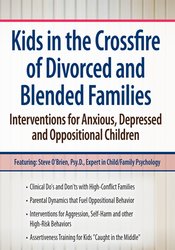
×

Children caught in the crossfire of divorce and those struggling with a new blended family frequently exhibit emotional and behavioral difficulties.
Children’s challenges may become exponential when divorce-related conflict is chronic and/or when parents’ new relationships lead to cohabitation or remarriage.
Kids end up stuck in the middle, taking on the role of fixer or therapist. Negative talk about each parent fuels blame games and regression while reunion fantasies persist.
Watch child-family psychologist, Dr. Steve O’Brien, who will provide you with a practical treatment approach for children struggling with anxiety, depression, and oppositional behavior secondary to divorced and blended family stressors.
Treatment techniques will include:
Upon watching this recording, you will walk away with multiple clinical tools and leave feeling empowered to take on the challenges of helping children struggling with highly stressful family transitions.
NOTE: Tuition includes one free CE Certificate (participant will be able to print the certificate of completion after passing the online post-test (80% passing score) and completing the evaluation). Instructional methods will include PowerPoint, didactic lecture, and others.
Continuing Education Information: Listed below are the continuing education credit(s) currently available for this non-interactive self-study package. Program content is reviewed periodically per accrediting board rules for currency and appropriateness for credit. Credit approvals are subject to change. Please note, your licensing board dictates whether self-study is an acceptable form of continuing education, as well as which credit types are acceptable for continuing education hours. Please refer to your licensing board's rules and regulations. If your profession is not listed, please contact your licensing board to determine your continuing education requirements and check for reciprocal approval.
For other credit inquiries not specified below, please contact info@pesi.com or 800-844-8260 before purchase.
Materials that are included in this course may include interventions and modalities that are beyond the authorized practice of your profession. As a licensed professional, you are responsible for reviewing the scope of practice, including activities that are defined in law as beyond the boundaries of practice in accordance with and in compliance with your profession's standards.
For Planning Committee disclosures, please see the statement above. For speaker disclosures, please see the faculty biography.
Earn up to 6.0 CE hours. Please see below, for more details, as credit amounts vary by jurisdiction and profession.

PESI, Inc., #1062, is approved as an ACE provider to offer social work continuing education by the Association of Social Work Boards (ASWB) Approved Continuing Education (ACE) program. Regulatory boards are the final authority on courses accepted for continuing education credit. ACE provider approval period: January 27, 2023 - January 27, 2026. Social workers completing this course receive 6.0 Clinical continuing education credits.
Course Level: Intermediate Format: Recorded asynchronous distance. Full attendance is required; no partial credits will be offered for partial attendance.
Canadian Social Workers: Canadian provinces may accept activities approved by the ASWB for ongoing professional development.
PESI, Inc. is approved by the Canadian Psychological Association to offer continuing education for psychologists. PESI, Inc. maintains responsibility for the program. This program is approved for 6.0 self-study continuing education hours. Full credit statement at: www.pesi.com/cpa-statement
This self-study activity qualifies for 6.0 continuing education clock hours as required by many national, state and local licensing boards and professional organizations. Save your activity advertisement and certificate of completion, and contact your own board or organization for specific requirements.
| File type | File name | Number of pages | |
|---|---|---|---|
| Manual - Kids in the Crossfire of Divorced and Blended Families (20.7 MB) | 62 Pages | Available after Purchase | |
| Text Document | Illinois Educators Webcast Instructions (0.02 MB) | Available after Purchase | |
| Illinois Educators Evaluation Form (1.17 MB) | Available after Purchase | ||
| Instructions for ASHA Credit - SELF STUDY ONLY - 11/06/19 (38.5 KB) | Available after Purchase | ||
| Manual - Kids in the Crossfire of Divorced and Blended Families - French (20.7 MB) | 62 Pages | Available after Purchase | |
| Manual - Kids in the Crossfire of Divorced and Blended Families - Italian (20.7 MB) | 62 Pages | Available after Purchase |

Steve O’Brien, PsyD, is a clinical psychologist with nearly 30 years of experience treating children, adolescents, families and young adults in his Clearwater, Florida practice. His specialty areas include child-adolescent anxiety/depression, ADHD, Autism Spectrum Disorders, and divorced/blended family adjustment. Dr. O’Brien utilizes an integrative-systems model, which tailors treatment to the developmental needs of youth and families. Intensive parent consultation and youth-focused family interventions are critical components of his therapeutic approach.
Dr. O’Brien has worked in numerous healthcare environments, including community mental health, psychiatric, inpatient/residential, substance abuse, and medical facilities. He also served as associate professor of child-adolescent studies at the Florida School of Professional Psychology. In addition to his clinical work, Dr. O’Brien is an app developer (Life@Home by Psychtouch.com) and a media consultant for both Tampa Bay and national news outlets. Visit obrienpsychology.com for more information.
Speaker Disclosures:
Financial: Dr. Steven O'Brien maintains a private practice. He receives a speaking honorarium, recording and book royalties from Psychotherapy Networker and PESI, Inc. He has no relevant financial relationships with ineligible organizations.
Non-financial: Dr. Steven O’Brien is a member of the American Psychological Association and the Florida Psychological Association.
Access never expires for this product.
Visit our FAQ page at https://www.pesicanada.com/faq or contact us at https://www.pesicanada.com/contact-us
CHALLENGES FOR CHILDREN FACING DIVORCE & FAMILY TRANSITION
Multiple Losses, Multiple Reactions
TREATMENT TECHNIQUES FOR KIDS IN THE CROSSFIRE
Intervention Strategies for Anxious Children
| 5 |
|
| 4 |
|
| 3 |
|
| 2 |
|
| 1 |
|
Satisfaction Guarantee
Your satisfaction is our goal and our guarantee. Concerns should be addressed to info@pesicanada.com.
Please wait ...